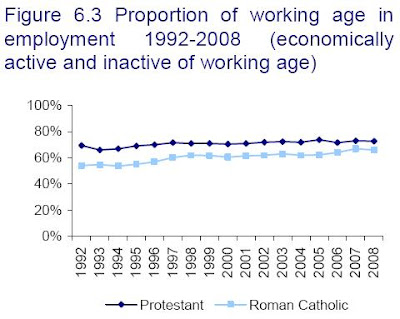The BBC
has announced that nine of the 18 UCUNF candidates for the Westminster election have now been jointly selected.
They are:
- Strangford – Mike Nesbitt
- Lagan Valley – Daphne Trimble
- Newry and Armagh – Danny Kennedy
- South Down – John McAlister
- Upper Bann – Harry Hamilton
- Mid Ulster – Sandra Overend
- West Tyrone – Ross Hussey
- West Belfast – Bill Manwaring
- East Belfast – Trevor Ringland
The obvious thing about these nine is that they are
all from the UUP. So this means that the Tories candidates (and there must be
some) will have to stand in the remaining nine constituencies.
It is already well leaked that Alliance turncoat
Ian Parsley will get the nomination for North Down, especially now that
Sylvia Hermon has ruled herself out of standing for UCUNF.
Fermanagh and South Tyrone contains few Tories and it would thus be totally counterproductive to pass over local UUP hopeful
Tom Elliott, so that one can almost certainly be added to the UUP total.
Since that effectively rules out almost everywhere west of the Bann, the Tories may be keen to stand in Foyle, just to demonstrate that they have not given up on the west of Northern Ireland before they even start. The fact that the UUP proposed candidate is not even from the constituency (he lives in Portballintrae!) will help.
East Derry too is likely to see a Tory candidate –
Duncan Crossey – especially as the UUP nominated a virtually unknown party member,
Lesley Macauley, so have little reason to insist on her.
That leaves five other constituencies: North Antrim, South Antrim, East Antrim, South Belfast and North Belfast. It is no surprise that these have been left till last, as they contain some of the most sensitive seats for the DUP. No doubt some hard thinking is going on in UUP and Tory circles about the right strategy for some of these seats, to avoid letting them fall to Sinn Féin or the TUV.
North Antrim is an obvious example.
Jim Allister has announced that he will stand here, with the express intention of decapitating the DUP. The seat is a target both for the TUV and the UUP, either of which could on a good day slip between a badly split DUP vote to take the seat. Whether the UUP will wish to surrender such a chance to the Tories, who are almost (
but not entirely) entirely absent from the constituency, is as yet unknown.
South Antrim is a more sensitive issue. The UUP have proposed
Adrian Watson, who is a known homophobe – which goes against recent Tory pronouncements – and was involved in the disgraceful episode in 2009 when unionist bigots complained when children in GAA tops packed bags in Tesco. Watson
claims that he did not actually complain, but
the BBC reported that he "
had passed complaints on to Tesco on behalf of some of his constituents". If it walks like a duck … So Watson's candidacy may be in doubt if the Tories decide that they do not want to be represented by an old-style UUP bigot. There is an opening here for the Tories to propose, say,
Tim Collins – a name that would attract DUP votes, and may cause the TUV to rethink
their intention to stand in the constituency.
East Antrim is a curious absence from today's UCUNF list. The Tories are not particularly popular here (as elsewhere in Northern Ireland), but it is the constituency of their chairman,
Tim Lewis. So perhaps they are playing hard-ball on this one in order to get something elsewhere.
South Belfast, of course, is the constituency in which the Tories have already been embarrassed by the withdrawal of their celebrity Catholic candidate,
Peter McCann. Presumably there are attempts behind the scenes to persuade him to come back. If they succeed, then he will presumably get the UCUNF candidacy, and the UUP's
Paula Bradshaw will have to try her hand at local politics.
North Belfast, as
this blog pointed out yesterday, is a very sensitive issue. The UUP have already nominated
Fred Cobain, but he has been their man in the area for a while and poses no particular threat to
Nigel Dodds of the DUP. But if the Tories find a credible candidate here who can improve on Cobain's poor score, then the seat just might fall to
Gerry Kelly. One option is to stand
Tim Lewis who comes from Newtownabbey and thus can claim to be local. He would score abysmally, of course, but this would save the Tories (and indirectly also the UUP) from being seen as helping Sinn Féin's chances in the constituency.
The announcement by UCUNF of its picks for the remaining nine constituencies will be interesting. This blog expects that the Tories will get the UCUNF candidacy in at least three: Foyle, East Derry and North Down, but must also get one or two more in the greater Belfast area – including at least one that is winnable. Whether they actually win it (or any seats) is far harder to say.
 It shows clearly that the proportion of children who are from a Catholic community background is over 50%, and has been over 50% for over a decade. The proportion from a Protestant community background had hovered at around 45% for around a decade.
It shows clearly that the proportion of children who are from a Catholic community background is over 50%, and has been over 50% for over a decade. The proportion from a Protestant community background had hovered at around 45% for around a decade.



















